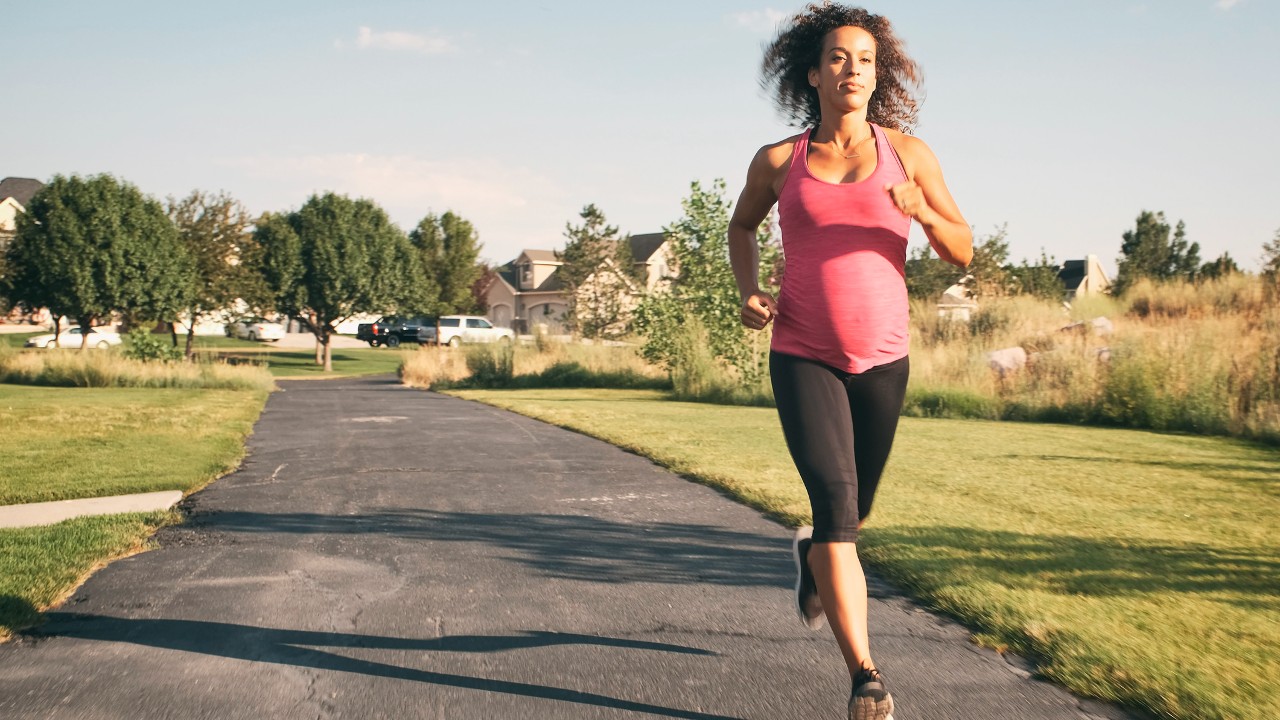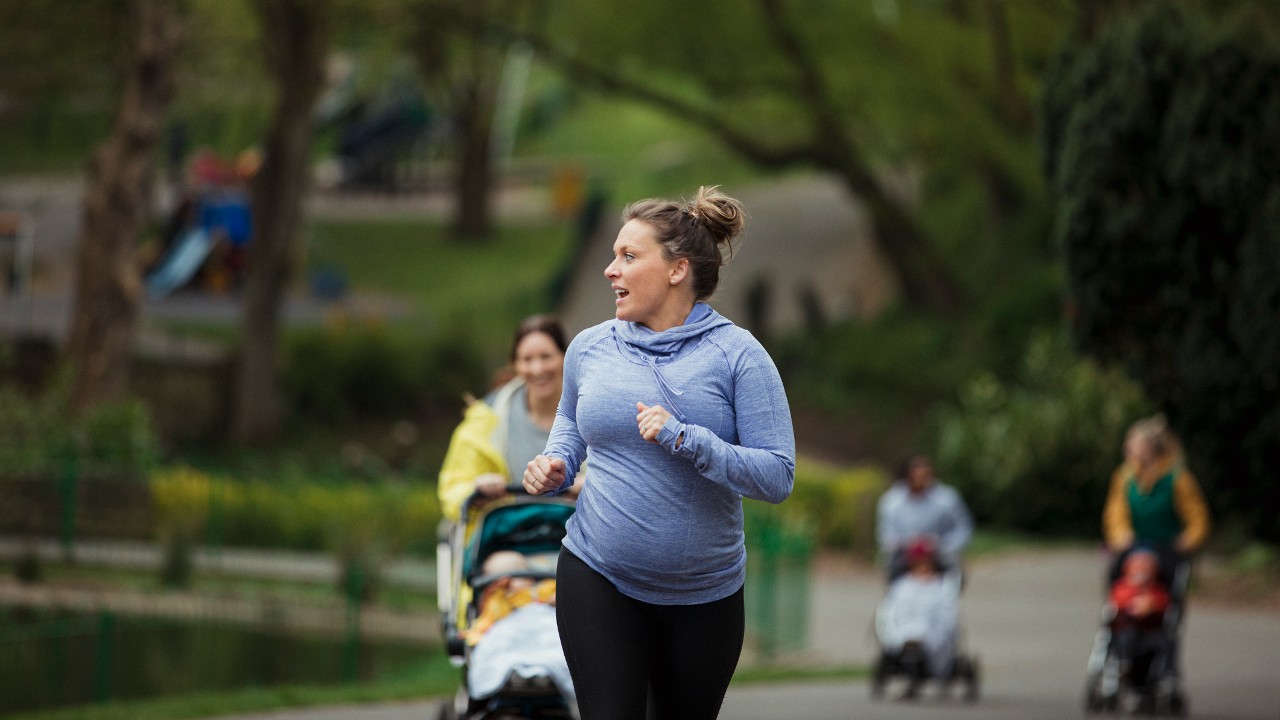Expert Advice On Running When Pregnant, From First to Third Trimester
The best ways to ensure a healthy running regime while pregnant – and when to stop

If you enjoyed running before you conceived, then you may well be keen to carry on running when pregnant. And the good news is that the UK’s NHS recommends exercising throughout pregnancy if you feel comfortable doing so.
The NHS advises that exercise during pregnancy may help you to adapt to changes in your body, cope with childbirth and recover afterwards. Studies have also found that moderate- and high-intensity exercise – such as running – in normal pregnancies is safe for a growing foetus.
It’s not all straightforward, however (what is?). There are still plenty of things to consider when deciding whether to run during pregnancy. The first is whether you’re a runner in the first place. Ellie Brown, running coach, pre- and postnatal specialist and founder of Ellie Brown Wellness, Fitness & Pilates in London, says you shouldn’t start running when pregnant if you’ve never run before, adding that Pilates, swimming and yoga are more gentle forms of exercise that keep you strong and can prepare you for the birth of your baby.
“However, it is very much up to the individual and every pregnancy can be different,” says Brown.
If the fear of miscarriage is putting you off running, Brown reasures us that there’s no research that shows that exercise causes miscarriage. Baby and pregnancy charity Tommy’s advises that if your pregnancy has no complications, then in fact it’s probably safer to exercise than not.
Generally, Brown advises that when running during pregnancy, you shouldn't be focusing on hitting any PBs. “Enjoy the exercise and think of it as supporting your overall wellbeing,” she says.
Here Brown talks us through running during the three trimesters of pregnancy. However, it is worth noting that the advice below is simply a guide and if you do have any concerns, contact a healthcare professional for individual advice.
Sign up for workout ideas, training advice, reviews of the latest gear and more.
Ellie Brown is a UKA Athletics coach and coaches Greenwich Runners, Kent AC and Buggy Runners. She has been a pre- and postnatal specialist for over 18 years, is a BCP Pilates teacher with 20 years experience and is also a stretch therapist.
Running During The First Trimester
Exercise is as important in pregnancy as it is before pregnancy, and it’s not just good for physical health. There is research which suggests that it may reduce the chances of high depressive symptoms during pregnancy too.
However, during the first trimester of pregnancy, up to week 12, you may be experiencing fatigue and exhaustion. “Because of this, you might want to reduce the length of your runs, and be sure to allow for rest days so that you aren’t exhausting your body even more,” says Brown.
Pregnancy-related sickness can be common during the first trimester, so staying hydrated is also wise. If you don’t feel like going for a run, you could try a walk instead.
Running During The Second Trimester
During weeks 13 to 27 your bump will be starting to show and you might find aching breasts can also get in the way of a comfortable run.
Be sure to wear comfortable running clothing. This includes a strong, supportive running bra (Coach’s best running bra recommendations include a section on bras for pregnancy and nursing mums), comfortable running trainers and leggings or shorts that can stretch and allow for the growth of your bump.
“It’s during the second trimester when you may feel stronger, but this is not the time to focus on speed work,” says Brown. That includes unstructured fartlek intervals – Brown recommends trying to keep a consistent pace.
Instead of your pace, focus on your running form: look ahead, try to relax your hands and keep them at waist height, and try to run lightly with shorter strides.
Running During The Third Trimester
It is during the third trimester – weeks 28 to 40 (and beyond) – that running will seem far harder than usual and Brown recommends reducing the length of your runs.
“I recommend running for no more than 30 minutes, and incorporating some walking into this too. NHS guidelines state that you should be able to talk while running so don’t go too fast!”
You might want to alternate between jogging and walking, and if you feel uneasy at any point, then stop.
Your bump will also be increasing in size during this trimester and you might find it harder to run as the weight of your bump can make running feel heavy and uncomfortable.

“Some women find that a pelvic belt – or belly band – helps support the bump when running,” says Brown.
The weight of your baby may start to apply more pressure on your bladder, causing you to need the toilet more often. Because of this, try not to run too far from a toilet (whether home or a public bathroom).
It is, of course, absolutely fine to stop running completely and you’ll be in good company. One study carried out on long-distance runners who ran competitively before pregnancy found that only 31% continued to run during their third trimester. And in trimester one and two, when they were running, they cut the intensity by half.
When To Stop
While it’s an individual decision, Brown says it’s best to consult a healthcare professional for advice if you’re experiencing preeclampsia, high blood pressure or severe anaemia, because these may mean you should avoid running when pregnant.
A multiple pregnancy where you’re expecting twins, triplets or more might be another reason to slow down or avoid running, although Brown does state that this very much depends on the individual.

Lucy is an experienced health and fitness journalist, and was formerly health editor for TI Media’s portfolio of women’s titles. Lucy qualified as a level 3 personal trainer with Train Fitness in 2016, and also holds qualifications in pre- and post-natal fitness, as well as in nutrition for exercise.
